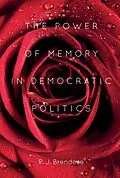George Orwell famously argued that those who control the past control the future, and those who control the present control the past. In this study of the relationship between democracy and memory, P. J. Brendese examines Orwell'sinsight, revealing how political power affects what is available to be remembered, who is allowed to recall the past, and when and where past events can be commemorated. Engaging a diverse panoply of thinkers that includes Sophocles, Friedrich Nietzsche, Jacques Derrida, James Baldwin, and Toni Morrison, Brendese considers the role of disavowed memory and the politics of collective memory in democratic processes throughout history. Among the cases treatedare democracy in ancient Athens, South Africa's effort to transition from apartheid via its landmark Truth and Reconciliation Commission, Mexico's struggle to fortify democratic accountability after the "dirty war," and the unresolved legacy of slavery in US race relations. The Power of Memory in Democratic Politics draws on these national histories to develop a theory of memory that accounts for the ways the past lives on in unconscious, habituated practices, shaping the possibilities of freedom, action, and political imagination.
P. J. Brendese is assistant professor of political science at Johns Hopkins University.
Autorentext
P. J. Brendese
Klappentext
Offers an examination of ancient, modern, and contemporary political theories and practices in order to develop a more expansive way of conceptualizing memory, how political power influences the presence of the past, and memory'songoing impact on democratic horizons.
George Orwell famously argued that those who control the past control the future, and those who control the present control the past. In this study of the relationship between democracy and memory, P. J. Brendese examines Orwell'sinsight, revealing how political power affects what is available to be remembered, who is allowed to recall the past, and when and where past events can be commemorated. Engaging a diverse panoply of thinkers that includes Sophocles, Friedrich Nietzsche, Jacques Derrida, James Baldwin, and Toni Morrison, Brendese considers the role of disavowed memory and the politics of collective memory in democratic processes throughout history. Among the cases treatedare democracy in ancient Athens, South Africa's effort to transition from apartheid via its landmark Truth and Reconciliation Commission, Mexico's struggle to fortify democratic accountability after the "dirty war," and the unresolved legacy of slavery in US race relations. The Power of Memory in Democratic Politics draws on these national histories to develop a theory of memory that accounts for the ways the past lives on in unconscious, habituated practices, shaping the possibilities of freedom, action, and political imagination.
P. J. Brendese is assistant professor of political science at Johns Hopkins University.
Inhalt
Introduction: Coming to Terms with Memory
The Tragedy of Memory: Antigone, Memory, and the Politics of Possibility
Remembering to Forget: Democratizing Memory, Nietzschean Forgetting, and South Africa's Truth and Reconciliation Commission
Introducing Segregated Memory and Segregated Democracy in America
Remembering What Others Cannot Be Expected to Forget: James Baldwin and Segregated Memory
Making Silence Speak: Toni Morrison and the Beloved Community of Memory
In Memory of Democratic Time: Specters of Mexico's Past and Democracy's Future
The Future of the Past: Unholy Ghosts and Redemptive Possibilities
Imprisoned by the Past: The Complexion of Mass Incarceration
Notes
Selected Bibliography
Index
